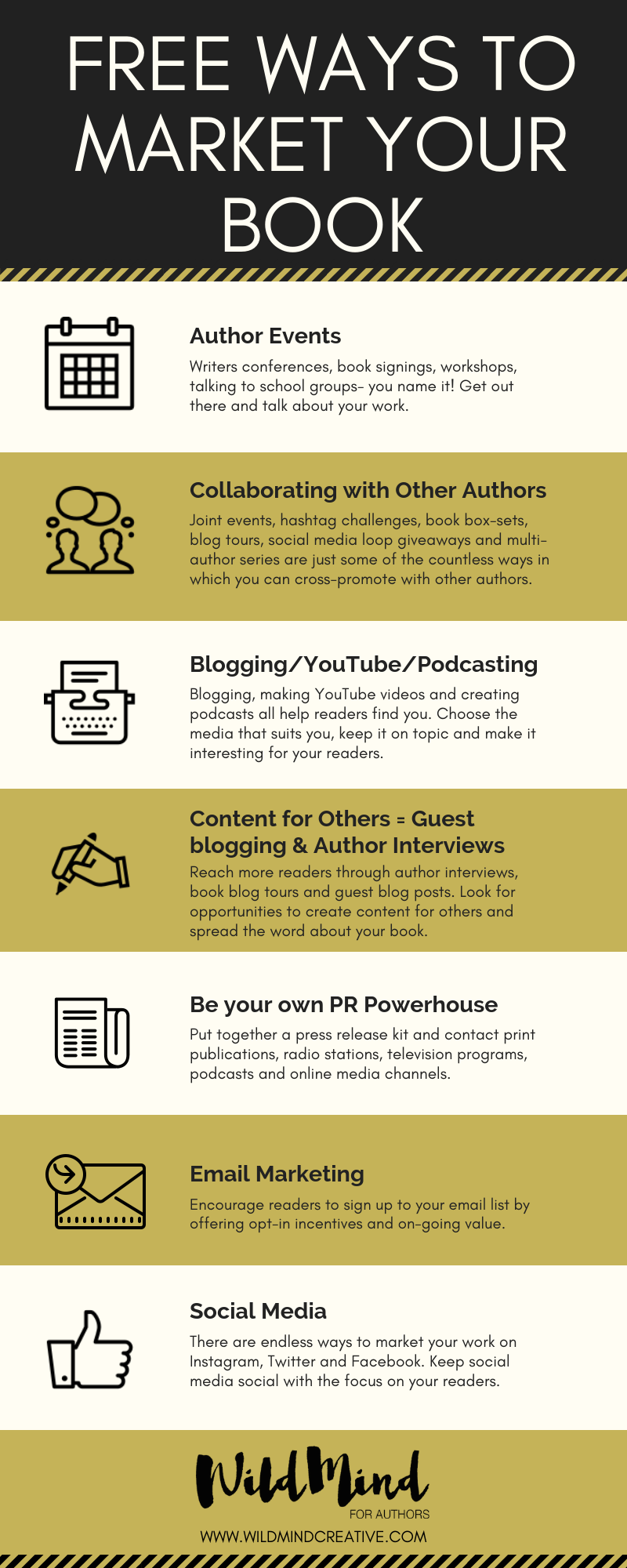Last week I had an author tell me that they would love to properly market their book but they felt that they had to be a millionaire to do it. Um, what? While no-one is going to tell you that some savvy advertising investment won’t help build your author brand, do you have to have a million dollars to make it happen? Definitely not. Here are 7 totally free book marketing ideas that you can get started on today.
1. Events
Writers conferences, book signings, workshops, talking to school groups- you name it! No matter how scary it is (yep, I can feel you introverts cringing from here) it is important to get out there and talk about your work. Look for opportunities to put your work out there and get to know your readers better. Can you host a discussion night or class? Is there a local book club or writing group that would be interested in an author event? What about an online challenge? Make the event an entertaining or learning opportunity rather than just preaching about your book. Show your readers some of the inspiration behind the story. Give them an insight into your writing rituals, your publishing journey, the setting, character development, struggles and edits. Don’t be afraid to share the highs as well as the lows, it doesn’t have to be all highlight reel to connect with your audience.
2. Collaborate with other Authors
Joint events, hashtag challenges, book box-sets, blog tours, social media loop giveaways and multi-author series are just some of the countless ways in which you can cross-promote with other authors. Get to know your fellow authors. Start online if that makes it easier. Join in group writing sprints, Facebook novelist groups and go to writer’s conferences. A writing network will keep you up to date on upcoming events and opportunities as well as providing much needed support, so get out there!
3. Blogging
Content marketing is not a new concept, but it remains an often overlooked way of getting more readers to your site. Blogging is fantastic for connecting with readers, establishing your expertise on a topic and boosting the Search Engine Optimization of your site. Blogging also gives you constant material to share on social media. Every piece you write can be turned into an Instagram post, Pinterest pin or shareable infographic. Not into writing blog posts? YouTube videos or podcasting may be more your style.
4. Guest blogging/Author interviews
So you have already established your website as a book marketing hub and now you want to stretch the net wider? What about content marketing for others? Reach more readers through author interviews, book blog tours and guest blog posts. Look for opportunities to create content for others and spread the word about your book.
5. Be your own PR Powerhouse
While it would be amazing to have a well-connected PR professional handle all the media relations outreach, often that is simply not affordable for self-published authors. This means it is time to be your own PR Powerhouse. Put together a press release kit and link to this kit on your author website, making it as easy as possible for others to share your work. Contact print publications, radio stations, television programs, podcasts and online media channels with a direct proposal. Consider angles that would interest their audience: local events, niche subjects your book covers, settings or topics of interest. Strive to be easy-to-work-with and professional: follow-up promptly, be courteous and offer additional materials where appropriate.
6. Email Marketing
Email marketing is ideal for connecting with readers in a highly personalized, budget-friendly way. In an age of information overload, email offers a unique way to directly connect with your readers. It is estimated that email marketing is 40 times more effective than Facebook and Twitter combined. Encourage readers to sign up to your email list by offering opt-in incentives and on-going value. Give your readers a behind-the-scenes look at your writing process, keep them informed about upcoming author events, limited-time specials, competitions and giveaways.
7. Social Media
There are endless ways to market your work on Instagram, Twitter and Facebook. Keep social media social with the focus on your readers. Stick to the rule of posting 80% useful, interesting content and 20% self-promotion. Engage with others, respond to comments and curate content that offers your readers value.












